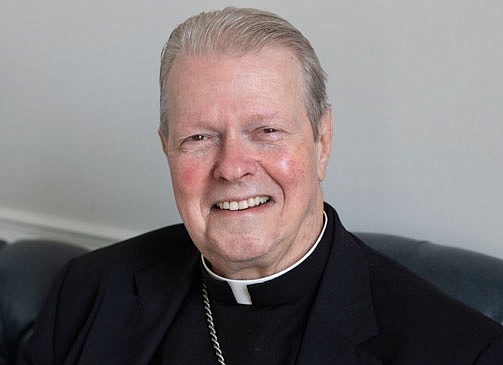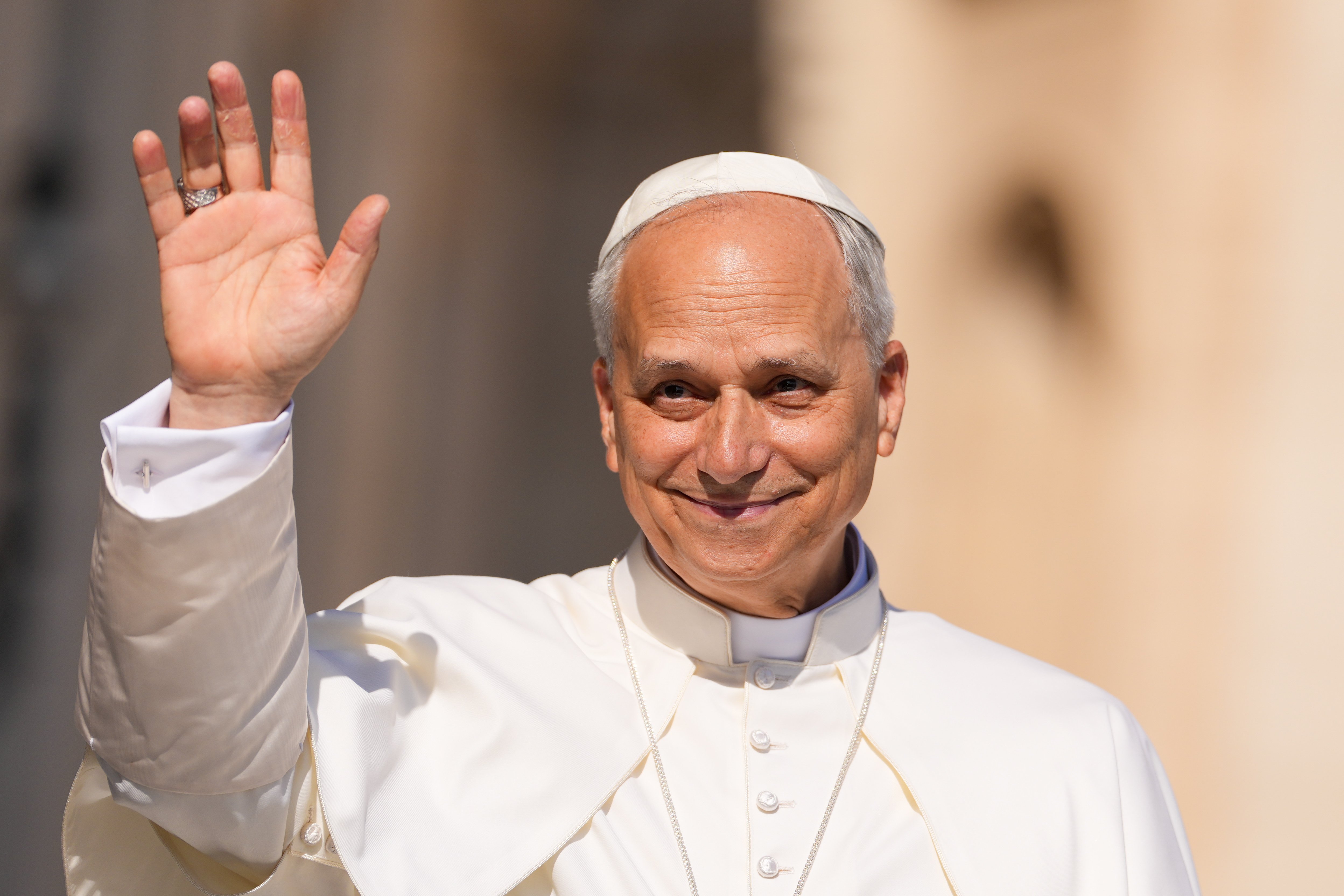August 17, 2023 at 7:00 a.m.
‘Be reasonable: See it my way’
No one is more inclusive than God. God wants all of us in heaven. To get there, however, to have the spiritual lungs, so to speak, to breathe the rarefied air of heaven, we all must become saints. Getting from here — wherever “here” is — to there is what our life on earth is all about. Maybe it’s not a matter of here or there — a question of where we are — but of who we are. What kind of people are we to become.
A good friend of mine whom I have known for years has never quite outgrown his childlike nature. That’s a good thing. Did not Jesus say, “unless you turn and become like children, you will not enter the kingdom of heaven” (Mt 18:3)? What does he mean by that? Why are children held up as a model? Because of their supposed innocence or naïveté? My friend is far from simple or naïve but, like a child, he loves Christmas. He says, it’s the time of year when people treat each other especially well and wouldn’t it be nice if everyone behaved all year long like so many do — or try to — at Christmas?
I guess part of his reasoning is that at Christmas people tend to focus more on kindness to others, on being especially patient and generous. We think of those less fortunate and want to reach out. A certain willingness to let our personal pet peeves aside to be led by the spirit of the season, what some call “the magic of Christmas.” Children are full of wonder and the expectation that surprises will be delightful. A complete dependency on “what will Santa bring” — their parents, of course — the willingness to trust.
Trust is not a particularly common phenomenon in our times, perhaps not in any age. The idea of surrendering one’s ego, one’s sense of control to another, to hope that someone else really has our best interests at heart is not something most of us readily find the capacity to do. Jesus, we know, once went missing in the caravan he had been traveling in with his parents. Remember the incident in which Mary and Joseph went looking for him — for three days, no less! — thinking that he was lost. They had been in Jerusalem for Passover. Jesus was 12. Searching frantically they finally found him in the temple, among the teachers. Less impressed with his genius — of which they were aware — than hurt by his seeming lack of empathy (“Son, why have you done this to us?”), they disclosed their anxiety (Lk 2:48).
At first it may seem as if Jesus were behaving like so many others his age who do not understand why they cannot have their own way — the right way — in how much ice cream they eat, or how late they can stay up, or with whom they can hang out. “Be reasonable and see it my way,” is their motto, an attitude which all too many folks seem to carry into their chronological adulthood. The onset of adolescence, the assertion of independence, is a break from the dependency of childhood. While necessary perhaps as a means of testing boundaries and limits, it must also, sooner or later, be tempered by the needs of others and the limits of time, money and biological contingencies. Having what we want when we want it all the time will make us ill, frustrated and, ultimately, very lonely. Friends will not tolerate a tyrant.
So what does Jesus do then? Instead of arguing with his parents or stubbornly refusing to obey until they have to drag him out, he puts his temporary absence into perspective for them: “Why were you looking for me? Did you not know that I must be in my Father’s house?” (Lk 2:49). Mary and Joseph at the moment were not likely to relish a theology lesson, but this was more than a smart answer from a headstrong adolescent. It was a revelation of who — whose will — was at the very center of his life. Joseph may not have been ready to take that answer easily. After all, he already knew he was not the father of Jesus, but surely he had been a good foster father to his son, teaching him his trade and, no doubt, the Scriptures as Jewish dads do. Jesus was known as “the carpenter,” like his legal father (Mt 13:55). We do not know how long Joseph was to live after this, but Mary was with her son right to the end of his life and beyond. This incident must certainly have come back to her when she would learn what it would really mean to be in his Father’s house, to do “the will of him who sent me” (Jn 4:34).
Rather than a bold assertion of his self-determined identity, what Jesus was proclaiming was his total submission to the will of the Father. Nothing — not even family loyalties and social conventions — would supplant this. Sometimes even religious ritual and custom became secondary to a higher human good. What serves to resolve any doubts about the extent of the humility and obedience of Jesus toward his earthly parents is the passage that closes the narrative. “He went down with them to Nazareth, and was obedient to them; and his mother kept all these things in her heart” (Lk 2:51). The last note not to be missed, as Mary would certainly recall at the foot of the cross.
This is the way to heaven! To want what God wants for us. To see what God sees in us and what we may become. So much sadness and pain remain in our lives if we see ourselves only in terms of our past. What we did nor did not do, only what happened to us. Many people avoid the Sacrament of Penance not only out of fear that somehow the confessor will be shocked (really?) or unkind about the decades gone by without taking the opportunity to hear the wonderful words of forgiveness. But how long does it make sense to hold those sins inside? To punish oneself with one’s own condemning judgment when God is only waiting to forgive? Others who may more frequently confess may be haunted by similar preoccupations with the past — the sins one may have forgotten to confess, or thought they had forgotten. Unless a serious sin is willfully withheld, all sins are forgiven with the words and signs of absolution. The hope and beauty of our sacraments is in that they offer us a future. We are so much more than our past.
I had suggested earlier that heaven may not be so much a place as a state of being. Eternity, not bound by space or time, is present to us even now, although we can hardly comprehend it — maybe not even in heaven itself with so awesome a mystery that God’s eternal presence is. My friend who loves Christmas so much in his childlike way is actually celebrating the Beatitudes, the commandments as Jesus taught them. If we take a moment to reflect on them, they describe human conditions and affects that, if lived by every disciple in the way Jesus affirms, would certainly be descriptive of the kind of world a heaven on earth would be, even in the face of persecution (cf. Mt 5:3-12). The only question is, why wait until tomorrow to live them?
The Beatitudes — some call them the BE-attitudes — are clearly what the Father wants and expects from us, to begin living here and now. The prayer that Jesus teaches his disciples — the Lord’s Prayer or “Our Father” — sums up the orientation and BE-attitude of one who seeks to follow the way of Christ toward heaven, by becoming a saint. And once we submit, as Jesus did, God does the rest.
In the end, it is a matter of being transformed into a great soul, of shedding the shackles that keep our souls small, our vision, our hearts from growing. Instead of altering the things on the outside our bodies, it proposes a way of transformation that begins inside. The seed was planted at Baptism and the promise of the Lord to be with us always as our way, truth and life assures us of the generosity of God’s presence, especially to the poorest of the poor or, dare we say, to children.
Jesus himself promised the kingdom to those who become as children. As we learn from his own example, we see that this consists of complete trust in God. God’s will is not at war with our wills. All Jesus exhorts us to do is to put God first. “But seek first the kingdom (of God) and his righteousness, and all these things will be given you besides” (Mt 6:33). As we see — and faith IS a way of seeing — those who put God at the center of their lives have found the pearl of great price, the treasure that guarantees that “all things work for good for those who love God” (Rm 8:28). God’s way IS the hi-way. Or as C.S. Lewis sums it up, “Put first things first and second things are thrown in. Put second things first and you lose both first and second things.”
@AlbanyDiocese
MORE NEWS STORIES
- Pope to Ukrainian Greek Catholics: ‘God will have the last word,’ ‘life will conquer death’
- ‘We are in this together’: Recent Supreme Court rulings support parents in their vocation
- Idaho Catholics unite in prayer for firefighters killed in sniper ambush
- Longtime head of Polish Catholic news agency resigns, as bishops seek tighter control
- ‘Revival Worship’ brings the fire of the National Eucharistic Congress into playlists
- US archbishops reflect on importance of fostering unity
- Slain Minnesota lawmaker, husband remembered for lives lived ‘with purpose, meaning’
- ANALYSIS: ‘Big Beautiful Bill’ trillion-dollar increases to US debt to hit poor hardest
- Archbishops must promote unity, seek new ways to share Gospel, pope says
- Experts: Catholic media witness to truth, Gospel and are at ‘kairos moment’ in church











Comments:
You must login to comment.